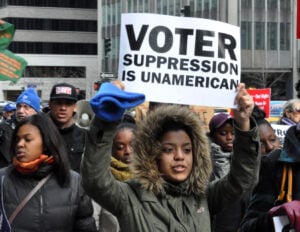This Thursday marks the one-year anniversary of the violent January 6th insurrection at the U.S. Capitol. The attack resulted in the deaths of 5 people, 140 injured Capitol police officers, and severe psychological trauma for many of the law enforcement officials who sought to protect our leaders in Congress. Those who stormed the Capitol put our democracy in jeopardy under a false belief that a democratic election stole victory from former President Trump.
The insurrection also set off a year of voting rights restrictions that particularly targeted communities of color, under the guise of combatting “voter fraud.” State legislators introduced over 400 bills designed to curb voting after record turnout in 2020. Some bills were successfully passed, including those in Texas and Georgia which went as far as empowering partisan poll watchers and banning the distribution of food and water to voters standing in line, respectively. Voting rights advocates have frequently referred to these laws as “Jim Crow 2.0,” slashing back decades of progress.

With the aftermath of January 6th ever present and midterm elections on the horizon, our leaders in Congress have a responsibility to ensure that voting is safe and accessible for all Americans. Enter the Freedom to Vote Act.
What is the Freedom to Vote Act?
The Freedom to Vote Act is the latest bill designed to protect voting rights across the country. It maintains some provisions from the For the People Act, but it also expands provisions to combat the kinds of behavior that surrounded the January 6th insurrection in other parts of the country. These include intimidation of voters and election officials and Interfering with vote counting.
The bill also takes on the restrictive voting laws popping up across the country. It prevents states from banning the distribution of food and water to those waiting in line to vote, expands automatic voter registration, and makes no-excuse absentee ballots available to voters in every state. Additionally, the Freedom to Vote Act makes Election Day a national holiday.
For more details on the Freedom to Vote Act and how it differs from the For the People Act, check out this report from the Brennan Center.
What’s next for the Freedom to Vote Act?
Senate Majority Leader Chuck Schumer announced that he will be bringing the Freedom to Vote Act to a vote on the Senate floor this week to coincide with the anniversary of the January 6th insurrection. Since the Freedom to Vote Act and the John Lewis Voting Rights Advancement Act were effectively killed by filibusters in the past year, making this connection will be critical in swaying moderate senators.
At the same time, this vote is a vital reminder that the filibuster is antiquated and allows a minority of senators to stifle the will of the people. Former President Obama has rightly referred to the filibuster as “a Jim Crow relic,” as it was often used to block civil rights legislation. We cannot allow our right to vote and participate in a democratic election to be hijacked. The filibuster has got to go.
Call your Senators at (202) 224-3121 or (202) 224-3091 (TTY). Urge them to eliminate the filibuster and pass the Freedom to Vote Act.
And don’t forget to stamp your bills to STOP THE ATTACK ON VOTING RIGHTS!
